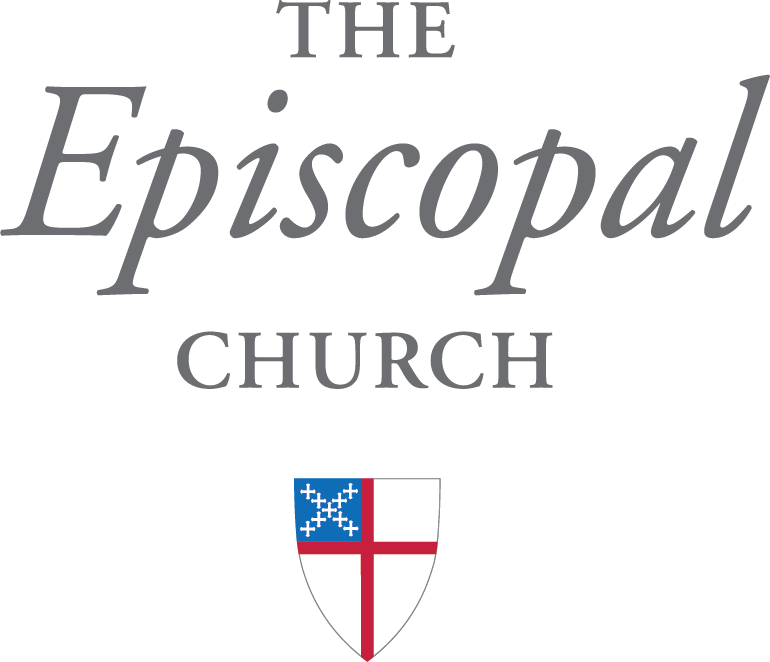Our Creeds – Our Prayers – Our Calling
Creeds are statements of our basic beliefs about God. The term comes from the Latin credo, meaning “I believe” – and speaks to us across the ages.
While we will always have questions about God, the Church, and our own faith, we have two foundational creeds that we use during worship: the Apostles’ Creed used at baptism and daily worship, and the Nicene Creed used at communion. In reciting and affirming these creeds, we join Christians across the world and throughout the ages in affirming our faith in the one God who created us, redeemed us, and sanctifies us.
The Apostles’ Creed
I believe in God, the Father almighty
creator of heaven and earth
I believe in Jesus Christ, his only Son, our Lord
He was conceived by the power of the Holy Spirit
and born of the Virgin Mary
He suffered under Pontius Pilate
was crucified, died, and was buried
He descended to the dead
On the third day he rose again
He ascended into heaven
and is seated at the right hand of the Father
He will come again to judge the living and the dead
I believe in the Holy Spirit
the holy catholic Church
the communion of saints
the forgiveness of sins
the resurrection of the body
and the life everlasting
Prayers often swell from the heart. Foundational prayers for the major events in our lives are recorded in The Book of Common Prayer -which and be traced through 17th Century England – to its roots in Holy Scripture. We believe these sacred texts contain “all things necessary for salvation” – interpreted through faith, tradition, and reason.
Our Call is to embrace the Great Commandment: “Love the Lord thy God with all our heart, and with all our soul, and with all our mind. This is the first and great commandment. And the second is like unto it, We shall love our neighbor as ourself.” (Matthew 22: 36-40)
Episcopal means “a church with bishops” – who are the leaders of the church and spiritual decendants of Jesus Christ. Maine’s cathedral (or “bishop’s church” in each diocese) is The Cathedral Church of St. Luke in Portland.
What it’s like to worship at an Episcopal church?
Dignified. Spirited. Friendly. Sunday is traditionally when Episcopalians gather for worship. The principal weekly worship service is the Holy Eucharist, also known as: the Lord’s Supper, Holy Communion or Mass. In most Episcopal churches, worship is accompanied by the singing of hymns, and in some churches, much of the service is sung.
The Holy Eucharist – or “Holy Thanksgiving”
In spite of the diversity of worship styles in the Episcopal Church, the Communion service or Eucharistic Service always has the same components and the same shape.
The Liturgy of the Word – Holy Scripture
We begin by praising God through song and prayer, and then listen to as many as four readings from Holy Scripture. Usually one from the Old Testament a Psalm, something from the Epistles (letters written to the ancient church) and (always) a reading from the Gospels. The psalm is usually sung or recited by the congregation.
Next, a sermon intepreting the readings appointed for the day is preached. The congregation then recites the Nicene Creed written in the Fourth Century and the Church’s statement of what we believe ever since. Next, the congregation prays together—for the church, the World, and those in need. We pray for the sick, thank God for all the good things in our lives, and finally, we pray for the dead. The presider, or celebrant (usually the priest or bishop) concludes with a prayer that gathers the petitions into a communal offering of intercession.
In certain seasons of the Church year, the congregation formally confesses their sins before God and one another. This is a corporate statement of what we have done and what we have left undone, followed by a pronouncement of absolution (the assurance of God’s unmerited and gracious forgiveness). In pronouncing absolution, the presider assures the congregation that God is always ready to forgive our sins.
The congregation then greets one another with a sign of peace, usually a handshake or head nod and the words:“Peace be with you.”
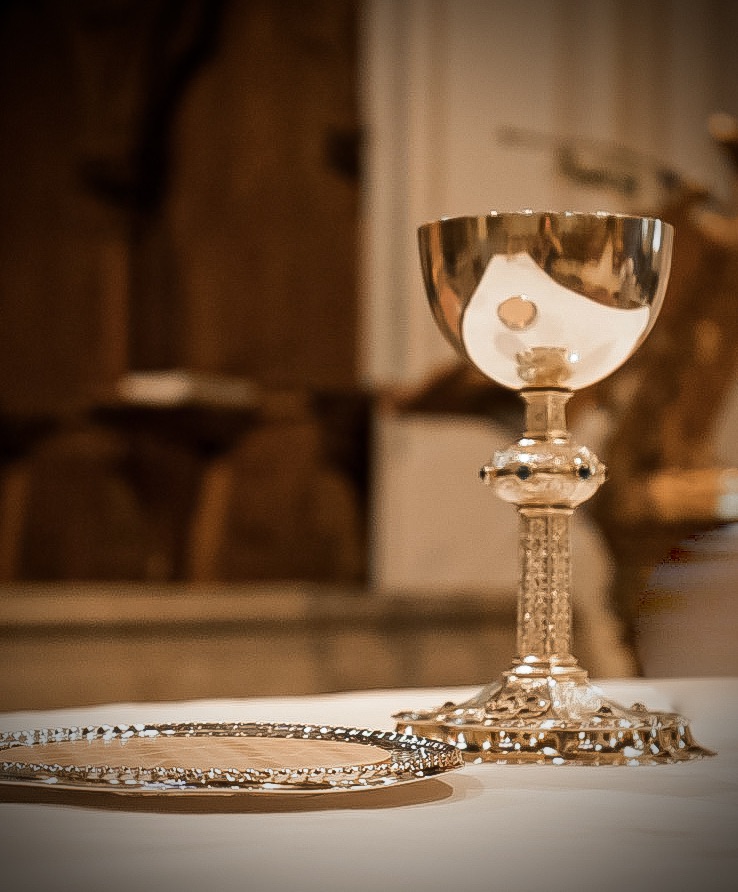

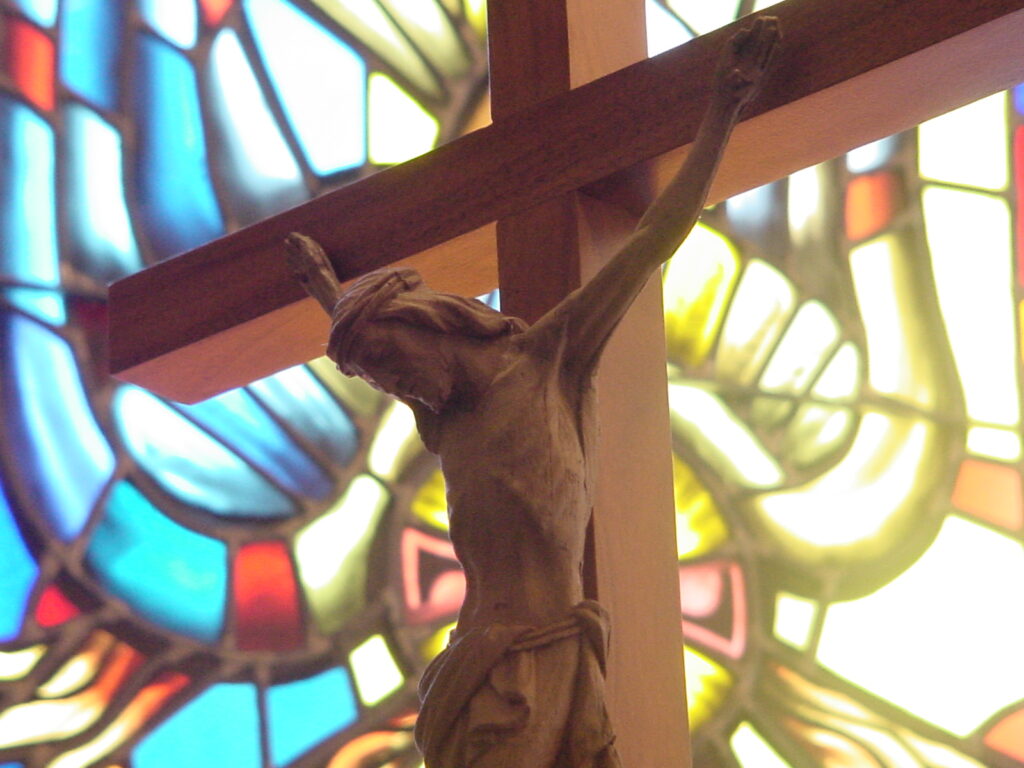
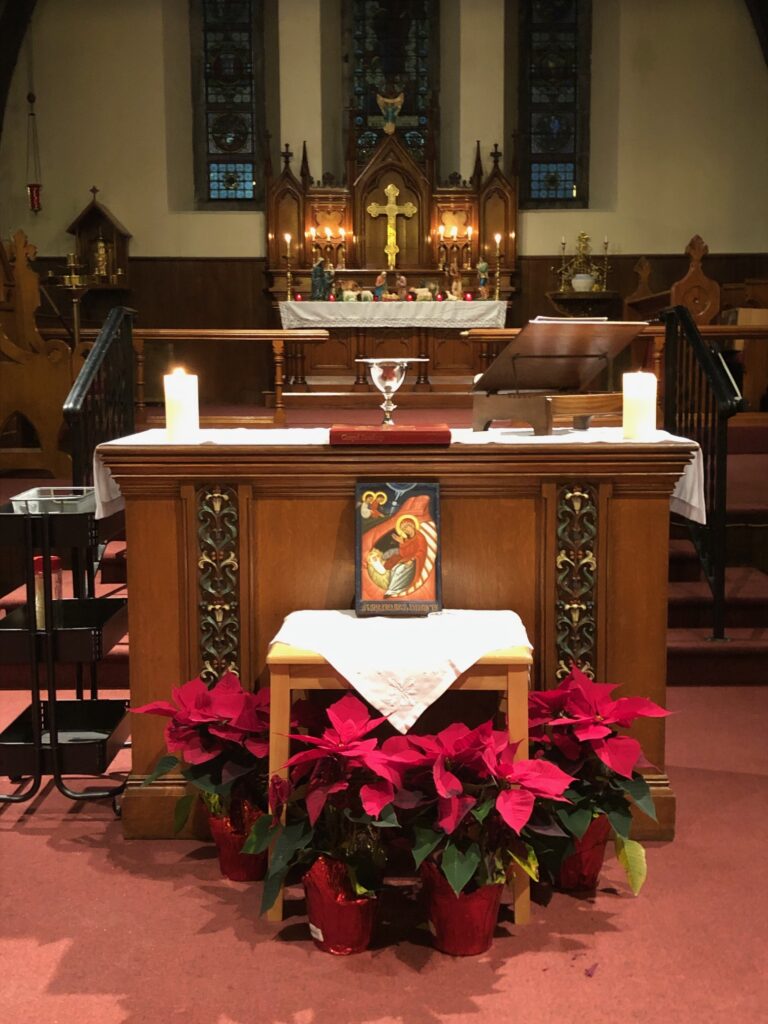
The Liturgy of the Table – or “Altar”
Next, the priest stands at the table, which has been set with a cup of wine and a plate of bread or wafers, raises his or her hands, and greets the congregation again, saying “The Lord be With You.” Now begins the Eucharistic Prayer, in which the priest tells the story of our faith, from the beginning of Creation, through the choosing of Israel to be God’s people, through our continual turning away from God, and God’s calling us to return. Finally, the priest tells the story of the coming of Jesus Christ, and about the night before his death, on which he instituted the Eucharistic meal (communion) as a continual remembrance of him.
The priest blesses the bread and wine, and the congregation recites the Lord’s Prayer. Finally, the priest breaks the bread and offers it to the congregation, as the “gifts of God for the People of God.”
The congregation then shares the bread and the wine. The people all come forward to receive the bread and wine. There are gluten-free wafers available on request. In the Episcopal Church, receiving the bread alone has traditionally been “full communion”. Those wishing to receive the blessing blessing of the Church, but not communion, and invited to indicate this by crossing your arms over your chest.
Everyone is welcome at our service, and all baptized Christian — no matter age, gender, sexuality, marital status or denomination—are welcome to “receive communion.”
At the end of the Eucharist, the congregation prays once more in thanksgiving, and then is dismissed to continue the life of service to God and to the World. Please sign the guest book and head to the parish hall downstairs to enjoy a cup of coffee and conversation!
Thanks to the Episcopal Church USA’s visitors center for providing the above instruction and information on “What to expect” when visiting an Episcopal church
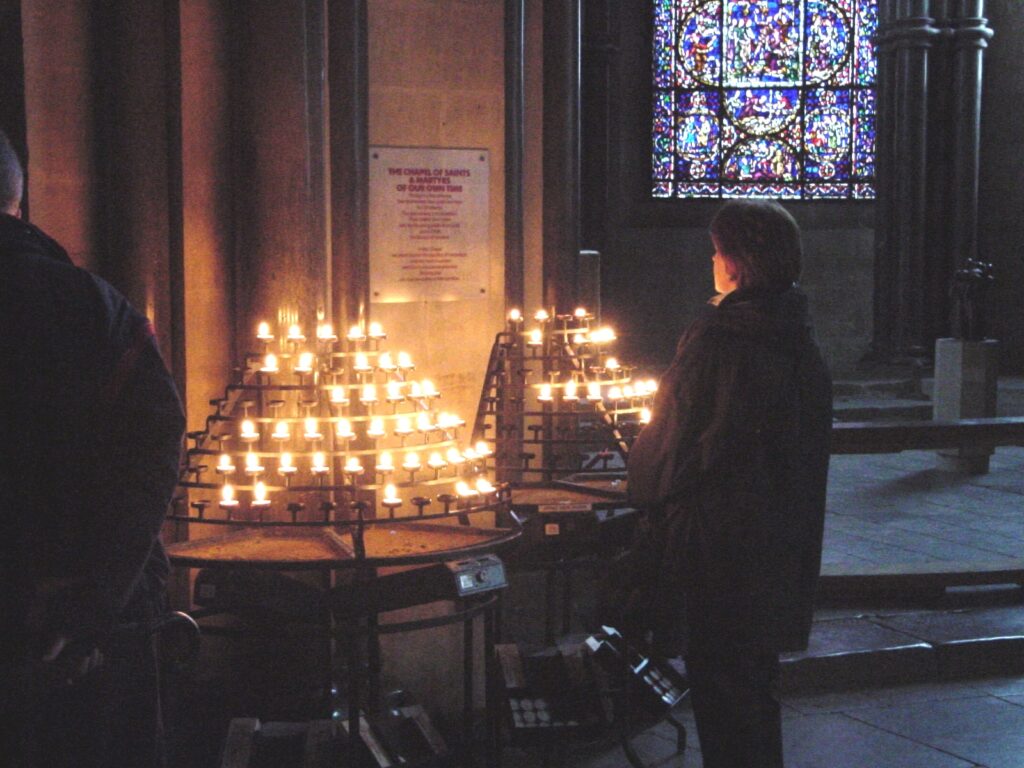
A pilgrim pauses for prayer in the Corona Chapel of Martyrs in Canterbury Cathedral, UK
Our Theology
As Episcopalians, we are followers of Jesus Christ, our Lord, and we believe in the Father, Son, and Holy Spirit.
The Episcopal Church has members in the United States and the territory of Puerto Rico; and also in Colombia, the Dominican Republic, Ecuador, Venezuela, Curacao, Austria, Belgium, France, Germany, Italy, Switzerland, Haiti, Honduras, Micronesia, Taiwan, and the Virgin Islands.
We strive to love our neighbors as ourselves and respect the dignity of every person
The Episcopal Church is part of the worldwide Anglican Communion, and traces its heritage to the beginnings of Christianity
Our liturgy retains ancient structure and traditions and is celebrated in many languages
Both men and women, including those who are married and single straight and gay are eligible for ordination as deacons, priests and bishops
We believe in amendment of life, the forgiveness of sin, and life everlasting
Lay people exercise a vital role in the governance and ministry of our church
Holy Communion may be received by all people, not only members of a church or faith community
We uphold the Bible and worship with the Book of Common Prayer
We affirm that committed relationships are lifelong and monogamous
Episcopalians also recognize that there is grace after divorce and do not deny the sacraments to those who have been divorced
We affirm that issues surrounding sexual health are matters of personal informed conscience
We celebrate our unity in Christ while honoring our differences, always putting the work of love before uniformity of opinion

Trinity Church and COMMONS
247 Bates Street, Lewiston, Maine 04240
Mailing address: P.O. Box 1402, Lewiston, Maine 04243-1402
(207) 910-7737
email: information@trinitylewiston.org

Trinity is part of the Diocese of Maine, Protestant Episcopal Church in the United States and the worldwide Anglican Communion
COPYRIGHT 2024
2
